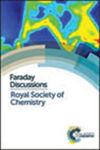核磁共振晶体学
IF 3.4
3区 化学
Q2 Chemistry
引用次数: 0
摘要
化学功能与原子的空间排列直接相关。因此,在过去 60 年中,原子级三维结构的测定改变了分子和材料科学。在此背景下,固态 NMR 已成为粉末状复杂材料原子级表征的首选方法。下面我们将概述目前化学位移驱动核磁共振晶体学的方法,并以复杂材料的应用为例进行说明本文章由计算机程序翻译,如有差异,请以英文原文为准。

Spiers Memorial Lecture: NMR crystallography
Chemical function is directly related to the spatial arrangement of atoms. Consequently, the determination of atomic-level three-dimensional structures has transformed molecular and materials science over the past 60 years. In this context, solid-state NMR has emerged to become the method of choice for atomic-level characterization of complex materials in powder form. In the following we present an overview of current methods for chemical shift driven NMR crystallography, illustrated with applications to complex materials.
求助全文
通过发布文献求助,成功后即可免费获取论文全文。
去求助
来源期刊

Faraday Discussions
CHEMISTRY, PHYSICAL-
CiteScore
4.90
自引率
0.00%
发文量
259
审稿时长
2.8 months
期刊介绍:
Discussion summary and research papers from discussion meetings that focus on rapidly developing areas of physical chemistry and its interfaces
 求助内容:
求助内容: 应助结果提醒方式:
应助结果提醒方式:


